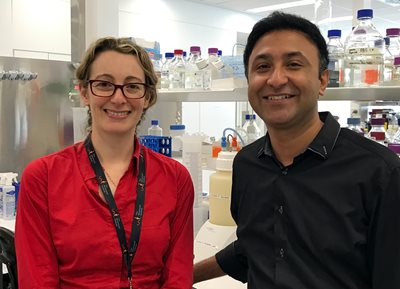December 18, 2019 Print
For the first time, research from The Westmead Institute for Medical Research (WIMR) has shown how a protein receptor known as CD47 can alter the body’s cellular ‘waste disposal and recycling system’, contributing to the potential development of acute kidney injury (AKI).
 Researchers Associate Professor Natasha Rogers and Dr Kedar Ghimire in the lab.
Researchers Associate Professor Natasha Rogers and Dr Kedar Ghimire in the lab.
The WIMR research team hopes that potential future therapies that block the function of CD47 could protect against cellular stress and improve the survival of renal tissue.
Recent studies have indicated that a cellular process called autophagy – the body’s way of cleaning out damaged cells so that it can regenerate new, healthy cells – is protective against AKI. In addition, the team from WIMR has previously shown that a protein receptor known as CD47 is induced in cases of AKI but, until now, little was known about CD47’s role in this potentially fatal condition.
Lead researcher, Associate Professor Natasha Rogers, who heads WIMR’s Kidney Injury Research Group, says this study set out to discover whether the way CD47 sends messages to other cells impacts the autophagy process, and therefore the development of AKI.
“Protein receptors, like CD47, are involved in the way cells communicate with each other. The messages relayed between cells can result in cell activation which can sometimes lead to cell death.
“For the first time, our research team has demonstrated that when CD47 is expressed in the kidneys, it can alter a number of steps in the autophagy process, and this contributes to the development of AKI,” said Associate Professor Rogers.
“We had previously shown that mutant mice lacking the receptor CD47 are protected from AKI but we weren’t sure how. Researchers have also been divided as to whether autophagy in the kidney was beneficial in protecting against AKI or not. However, recent advances in how we detect autophagy within cells means we now understand autophagy is beneficial. Importantly, if you increase autophagy then you can protect the kidney.
“In this research we have shown that by removing CD47, the levels of autophagy proteins are increased in the kidney, allowing cells to rapidly recycle damaged components and therefore stay alive.”
Understanding the causes of AKI and identifying potential treatments is vital, as AKI is a global health concern. The most recent Australian figures indicate that in 2012-2013, there were 131,780 hospitalisations involving AKI.
[1] In 2012, there were around 5,160 deaths where AKI was recorded as the underlying or associated cause of death.
[2]
AKI is the sudden onset of kidney failure or kidney damage and can occur over a few days or even hours. It causes a build-up of waste products, meaning that the kidneys struggle to maintain a balance of fluid.
The primary causes of AKI include reduced blood supply to the kidneys, which can happen as a result of a heart attack or surgery, a severe infection, the effect of a drug or radioactive dye that causes damage to kidney tissue, or an obstruction to urine leaving the kidney, which can occur as a result of kidney stones or an enlarged prostate.
[3]
AKI impacts many people, and also places significant medical and economic burden on the healthcare system. It often results in hospitalisations, as well as being a common ‘hospital-acquired’ disorder. AKI is associated with high morbidity and mortality.
[4]
Associate Professor Rogers said, “Even if a patient survivesthe acute illness, AKI remains a major risk factor in the development of chronic kidney disease and the progression to end-stage renal disease.
“Our research, combined with other previous findings, increasingly indicates that blocking CD47’s ability to communicate with other cells could be a promising therapeutic target. By stopping CD47 from impacting the autophagy process, we could protect against cellular stress and improve renal tissue survival.
“The next step for this research is to find ways to block CD47, leading, in the long-term, to the development of a new treatment for AKI.”
This research was conducted by a team at WIMR, which included Honours student Maryam El-Rashid (who is now studying Medicine at ANU) and postdoctoral fellow, Dr Kedar Ghimire.
This research was published in the
FASEB Journal -
https://www.fasebj.org/doi/10.1096/fj.201900120RR
Associate Professor Natasha Rogers is affiliated with The Westmead Institute for Medical Research, Westmead Clinical School and the Starzl Transplant Institute (USA).
[1] Australian Institute of Health and Welfare 2015. Acute kidney injury in Australia: a first national snapshot. Cat.no. PHE 190. Canberra: AIHW.
[3] https://kidney.org.au/your-kidneys/detect/acute-kidney-injury
[4] Australian Institute of Health and Welfare 2015. Acute kidney injury in Australia: a first national snapshot. Cat.no. PHE 190. Canberra: AIHW.